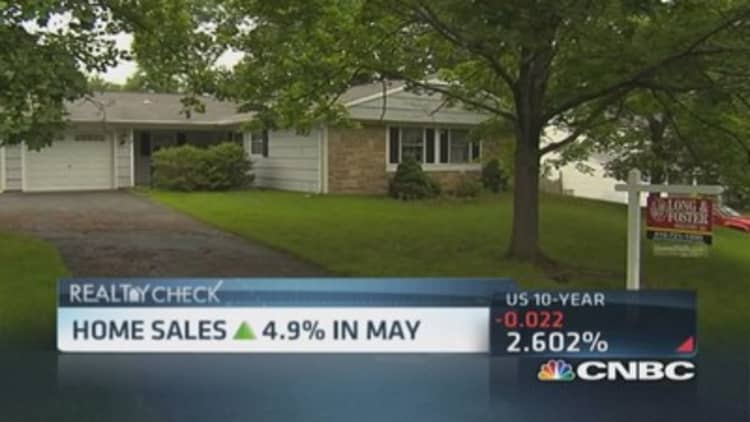
For the first time in a year, mortgage rates are now lower than they were a year earlier. That, however, may be short-lived, and some claim it's due in part to surging rents.
The National Association of Realtors' chief economist, after reporting Monday a surge in May home sales, warned that mortgage rates could rise due to rent inflation.
"Given that housing is the biggest weight to overall consumer price inflation, if this rent trend continues, and it could easily because vacancy rates are falling and falling, then the overall CPI inflation will be higher than anticipated, which will then force the Federal Reserve to raise interest rates sooner than later," said the economist, Lawrence Yun.
Mortgage rates have not moved much in the past year, since they jumped last June. The Federal Reserve slowed its purchases of agency mortgage-backed securities, but enough investors moved in to fill the gap, and other economic concerns kept rates at bay.
But apartment rents are rising at the fastest pace in five years, and vacancies are near record lows. Could rent really force the Fed's hand? Some economists disagree.
Read MoreApartments fill as rental demand keeps on surging
"I just don't see a scenario where interest rate policy would be driven by apartment rents," said Sam Chandan of Chandan Economics. "Monetary policy is a blunt instrument that impacts almost every aspect of the U.S. economy. If, for a subset of American households, rents are rising at a rate that is above historic norms, adjustments in monetary policy are not the appropriate intervention."
That is because rising rates mean higher financing costs for every aspect of the economy. The Fed has also signaled it has a higher tolerance for inflation. Rates are expected to rise slightly in the second half of the year, but due to bigger economic factors than just rent.
Much of the rent demand is driven by a lack of first-time home buyers. They made up just 27 percent of home sales in May, according to the Realtors. While rent may be high, renters do not have to come up with down payments, and they do not need superior credit scores. With vacancies so low, landlords have the power, and an increase in interest rates is unlikely to ease rent pressure on tenants. A stronger economic recovery will ease that strain.
Read More US existing home sales, inventory surge in May
"The first-time buyer continues to be faced with the secular trend of strict lending standards and excessive student debt that have them more inclined to rent," noted Peter Boockvar, chief market analyst for The Lindsey Group. "Hopefully the improved labor market picture with 200,000-ish monthly job gains can further steady the market as sales are still down 33 percent from the 2005 peak."
Rising interest rates won't help first-time buyers, but perhaps they won't hurt as much if job and income growth rises at a more robust pace. A larger supply of homes for sale will also ease prices further, which could make up for the rise in rates, which, again, have not been the biggest driver or impediment to sales in the past year.
Read MoreWhy jobless millennials are killing housing
"Existing home sales are still 9 percent below the level in July when the impact of last year's hike in mortgage interest rates first started weighing on home sales," noted Paul Diggle, property economist at Capital Economics.
—By CNBC's Diana Olick


